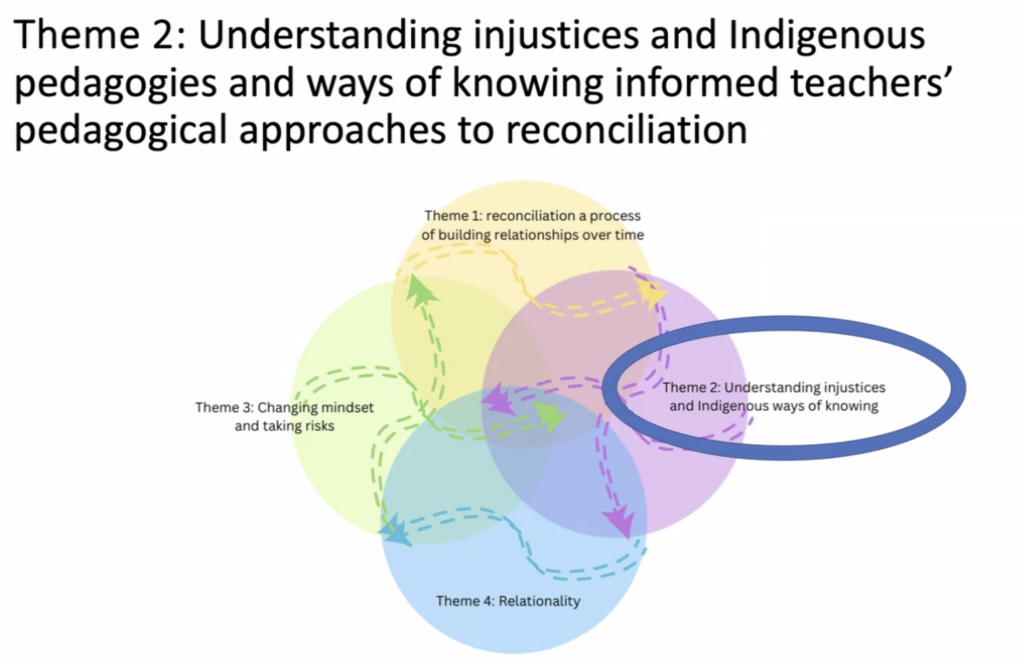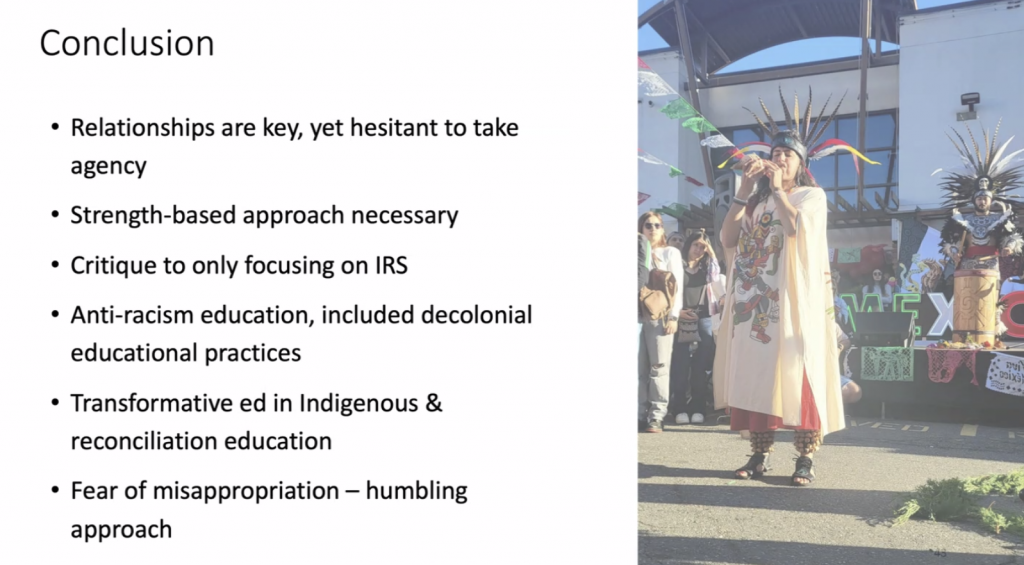Summary of SyMETRI Meeting: March 25, 2025 by Qiaochu Xu
Presenter/Guest Speaker: Dr. Maria Jose Athie Martinez, a recent graduate from Department of Curriculum and Pedagogy from the University of British Columbia
Date: March 25th, 2025
Host: Dr. Cynthia Nicol
On March 25, 2025, Dr. Maria Jose Athie Martinez presented her PhD dissertation research on Understanding Reconciliation in the Classroom: Teachers’ Responses to the Truth and Reconciliation Commission of Canada Calls to Action. This session was an opportunity to learn about her insightful study and engage in a workshop-style discussion on bringing Indigenous perspectives and reconciliation education into our own teaching, particularly in mathematics.
This research was guided by Indigenous Storywork principles (Archibald, 2008) of relationships—interrelatedness, respect, reciprocity, reverence, responsibility, wholism, and synergy—and to this, she added relevance. She also drewupon her experiences with Mexica dance to offer a research approach and lens for understanding the world, as well as to give meaning to this study. The findings of this dissertation were organized around four themes:
- Teachers perceived reconciliation as a process of building relationships over time;
- Teachers’ pedagogical approaches to reconciliation were informed by understanding injustices and Indigenous pedagogies and ways of knowing;
- Indigenous and reconciliation education required changing mindsets and taking risks; and
- Teachers emphasized the importance of relationality at multiple levels.
This study offered insights about the importance of building relationships between Indigenous and non-Indigenous people as processes of reconciliation.
Participating teachers’ understanding of reconciliation, as described through their teaching practices, either emphasized the injustices Indigenous people had experienced and continued to experience or drew upon Indigenous teaching practices as acts of reconciliation. Teachers reported that successful and effective Indigenous and reconciliation education required moving out of their comfort zones and changing both their own and their students’ perspectives. Conclusions highlighted how non-Indigenous teachers understood Indigenous and reconciliation education. This study also offered the Mexica dance as both method and metaphor for reconciliation education, emphasizing the ongoing need to build relationships between Indigenous and non-Indigenous people across educational fields.
Here are some slides from Maria’s presentation:
SyMETRI members expanded the conversation by reflecting on what reconciliation meant to them and what role they believed they had in advancing reconciliation through their teaching practices. Some members shared personal reflections on their connections to land and to their hometowns, considering the historical, cultural, and personal significance of these places in relation to Indigenous territories. Others raised thoughtful questions about the use of Mexica dance as a research approach for understanding the world, expressing interest in how embodied cultural practices can contribute to educational inquiry. Additionally, participants asked for concrete examples of teaching strategies for introducing reconciliation in the classroom and engaged in discussion about how such approaches might differ when teaching Indigenous students, highlighting the importance of relationality, responsiveness, and cultural awareness in pedagogical practice.
Bio
Dr. Maria Jose Athie Martinez is a Mexican Mestiza scholar, passionate advocate for Indigenous rights. She is an educator with a passion for decolonizing, indigenizing and culturally responsive education. Specialization in Indigenous, reconciliation, culturally responsive education. Dr. Athie Martinez’s research explores how seven non-Indigenous teachers in Greater Vancouver are responding to the Truth and Reconciliation Commission of Canada’s Calls to Action, integrating Indigenous perspectives into their teaching. Through Indigenous Storywork principles and her own experiences with Mexica dance, she offers a lens for understanding reconciliation education as a relational and transformative process.



Players need to work on their reflexes and establish the appropriate beat for each level in space waves.